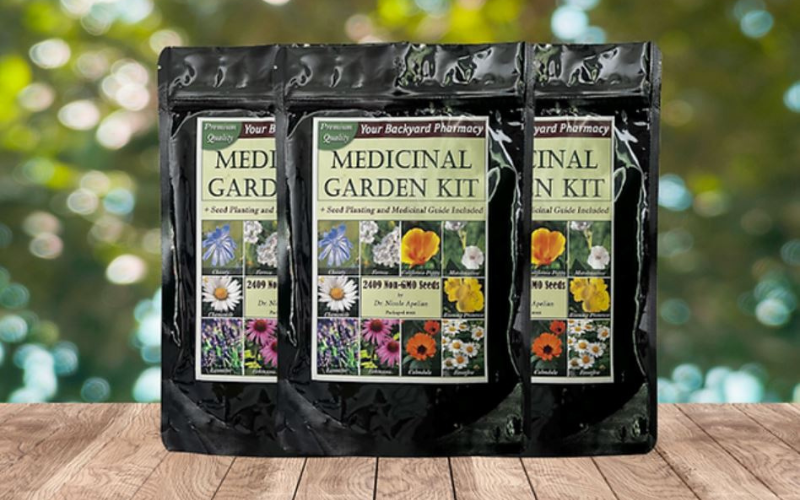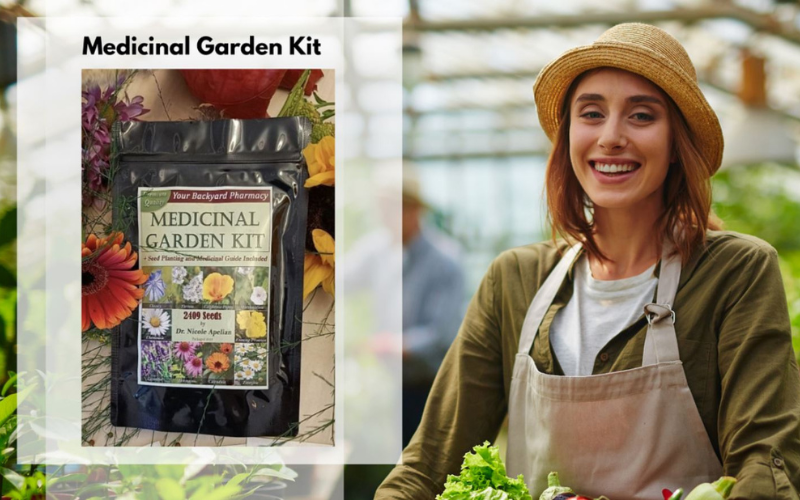In today’s fast-paced world, many people are looking to return to their roots by exploring the healing power of nature. The concept of a Medicinal Garden has gained widespread popularity as more individuals seek to cultivate their own natural remedies at home. Whether you’re an experienced gardener or a novice with a growing interest in herbal medicine, a medicinal garden is the perfect way to create a sustainable, self-sufficient source of health and wellness.
In this review, we will take a deep dive into a comprehensive Medicinal Garden Seed Kit that provides you with all the essentials to start your own medicinal garden, growing a variety of potent herbs with therapeutic benefits. Let’s explore how this kit can be a valuable addition to your home and lifestyle.
What Is a Medicinal Garden?
A Medicinal Garden is a dedicated space where individuals cultivate a variety of plants and herbs renowned for their healing properties.
These plants have been used for centuries in traditional medicine to address a wide array of health concerns, ranging from digestive issues and respiratory problems to skin conditions and stress relief.
By growing your own medicinal herbs, you gain access to a natural pharmacy right in your backyard, allowing you to create homemade remedies like teas, tinctures, salves, and infusions.
The beauty of cultivating a medicinal garden lies in its sustainability and personal health benefits. You can ensure that the herbs you grow are completely organic, pesticide-free, and fresh, giving you peace of mind about the remedies you’re using.
This also reduces your dependence on synthetic medications and allows you to reconnect with nature, fostering a more holistic approach to health and wellness. Additionally, growing a medicinal garden can be a therapeutic and rewarding experience, as it nurtures both your body and mind.
The Benefits of a Medicinal Garden
Growing your own medicinal garden offers a multitude of benefits that extend far beyond the beauty and aroma it brings to your outdoor space. It’s a practical, sustainable, and educational approach to natural health that has profound advantages for your well-being and lifestyle. Here are the key benefits of cultivating a medicinal garden:

1. Access to Natural Remedies
One of the most significant benefits of a medicinal garden is the ability to grow your own fresh, organic herbs that can be transformed into a variety of natural remedies. Herbal medicine has been practiced for centuries, offering alternatives to synthetic medications for treating common ailments such as colds, headaches, digestive issues, skin irritations, and more. By having a medicinal garden at home, you can easily prepare herbal teas, tinctures, salves, and poultices, all of which harness the healing properties of the plants.
For instance, herbs like chamomile and lavender are known for their calming effects and can be used in teas to reduce stress and promote better sleep. Echinacea and thyme can boost the immune system, helping to ward off colds and respiratory infections. Having these plants on hand provides a natural first-aid kit right in your backyard.
2. Cost-Effective Health Solutions
Establishing a medicinal garden requires an initial investment of time, effort, and resources, but once it’s set up, it can significantly reduce your dependence on store-bought herbal supplements and medications. Herbal supplements can be costly, especially when purchased frequently. However, by growing your own medicinal plants, you ensure a constant supply of fresh herbs that can be harvested and stored for long-term use.
Moreover, you won’t need to buy expensive teas, essential oils, or over-the-counter herbal products because you can create these remedies yourself. Over time, this can lead to substantial savings, making a medicinal garden a cost-effective solution for maintaining health and wellness.
3. Sustainability and Eco-Friendly Living
Another major advantage of growing a medicinal garden is its contribution to a more sustainable and eco-conscious lifestyle. By cultivating your own plants, you’re actively reducing your carbon footprint. There’s no need to rely on store-bought products that may have been transported over long distances, contributing to carbon emissions. Plus, when you grow your own herbs, you can ensure they are grown organically, free from pesticides and harmful chemicals that can pollute the environment.
In addition, medicinal gardens contribute to biodiversity by attracting pollinators like bees, butterflies, and birds, all of which play a vital role in maintaining ecological balance. This not only helps your garden thrive but also supports local ecosystems, making it a win-win for both you and the environment.
4. Self-Sufficiency and Empowerment
Cultivating a medicinal garden fosters a sense of self-reliance and empowerment. Knowing that you can grow your own remedies for common health concerns—such as minor cuts, burns, or respiratory infections—gives you the confidence to take control of your well-being. You become less dependent on pharmacies and commercially produced products, enabling you to handle minor health issues using natural and safe alternatives.
Additionally, in times of uncertainty, such as during a crisis or shortage of medical supplies, a medicinal garden can provide essential remedies that are readily available and effective. This aspect of self-sufficiency is invaluable, offering peace of mind knowing that you can take care of yourself and your family using homegrown resources.
5. Educational and Therapeutic Experience
A medicinal garden also provides an educational opportunity to learn about the rich history of herbal medicine and the benefits of various plants. It encourages you to research and explore the properties of different herbs, deepening your understanding of natural healing practices and plant care. This knowledge not only benefits your health but also allows you to share what you’ve learned with others, promoting a holistic approach to wellness in your community.
Furthermore, tending to a garden can be a therapeutic activity. Gardening is known to reduce stress, improve mood, and promote mindfulness. The act of planting, nurturing, and harvesting herbs can be incredibly rewarding, offering both physical and emotional benefits. The combination of fresh air, hands-on work, and the satisfaction of cultivating something from the earth contributes to a greater sense of well-being.
6. Customization of Remedies
With a medicinal garden, you have the freedom to customize remedies to suit your specific health needs. You can grow herbs that target your particular concerns, such as peppermint for digestive relief, valerian for sleep support, or calendula for skin healing. This personalized approach allows you to create a customized herbal pharmacy tailored to your and your family’s health requirements.
By experimenting with different combinations of herbs, you can create synergistic remedies that enhance the healing properties of individual plants. For example, combining ginger and turmeric for inflammation or lemon balm and lavender for stress relief can maximize the effectiveness of your treatments.
7. Healthier Lifestyle and Diet
Growing medicinal herbs often leads to incorporating more herbal remedies and teas into your daily routine, which can positively influence your overall lifestyle. Drinking herbal infusions like dandelion or nettle tea can help detoxify the body, while consuming fresh herbs like basil, cilantro, and oregano can add nutrients and flavor to your meals. Incorporating these herbs into your diet contributes to better health and wellness over time.
A medicinal garden promotes a holistic approach to health, where prevention, natural healing, and wellness become a part of your everyday life. It encourages you to seek out natural solutions for common ailments and nurtures a connection to the earth that is both grounding and health-enhancing.
8. Aesthetic and Aromatic Benefits
While the primary focus of a medicinal garden is health and wellness, it also adds aesthetic value to your outdoor space. Many medicinal plants are visually appealing, with vibrant flowers, lush green foliage, and fragrant aromas that can enhance the beauty of your garden. Herbs like lavender, echinacea, and chamomile add color and texture to your garden while also attracting pollinators.
The aromatic qualities of herbs like rosemary, thyme, and mint create a soothing and inviting atmosphere, making your garden a peaceful retreat for relaxation and meditation. The sensory experience of walking through a medicinal garden can be incredibly calming and refreshing, making it a place of both healing and beauty.
Overview of the Medicinal Garden Seed Kit

The Medicinal Garden Seed Kit is an exceptional tool for anyone looking to grow their own healing herbs at home. With this kit, you can cultivate a natural pharmacy in your backyard, filled with plants known for their therapeutic properties. Whether you’re a beginner in gardening or an experienced herbalist, this seed kit offers a convenient and cost-effective way to access medicinal herbs without relying on store-bought supplements or remedies.
Key Features of the Medicinal Garden Seed Kit
One of the primary benefits of this seed kit is that each herb is non-GMO and organically sourced, ensuring that you’re cultivating pure, natural plants. These plants have been chosen for their therapeutic properties, ease of growth, and ability to thrive in a variety of climates and soil conditions. This makes it possible for nearly anyone, regardless of gardening experience or geographic location, to successfully grow a medicinal garden at home.
The kit comes with eight different medicinal herb seeds, each with unique health benefits and uses. Here’s a closer look at each of these powerful herbs and what they can offer:
1. Calendula (Calendula officinalis)
Calendula is a versatile medicinal herb renowned for its skin-soothing properties. Often used in creams, salves, and oils, calendula is effective for treating minor burns, wounds, and skin irritations. This herb has anti-inflammatory, antiseptic, and antifungal properties, making it a go-to remedy for skin health. Calendula can also be used to reduce swelling, fight infections, and stimulate tissue regeneration, promoting faster wound healing.
Growing calendula at home allows you to create your own natural skincare remedies, from balms to infused oils. It’s an easy-to-grow plant that thrives in full sunlight, making it a perfect addition to any medicinal garden.
2. Yarrow (Achillea millefolium)
Yarrow is a powerful herb with a long history of medicinal use. It’s often called a “healing herb” because of its ability to stop bleeding and promote wound healing. Yarrow is also known for its anti-inflammatory, antimicrobial, and astringent properties, making it useful for treating cuts, scrapes, and minor burns.
Internally, yarrow is used as a natural fever reducer, helping to promote sweating and lower body temperature. It can also aid digestion and relieve symptoms of colds and flu. Having yarrow in your garden provides an all-purpose medicinal herb that can be used both topically and internally.
3. Echinacea (Echinacea purpurea)
Echinacea is one of the most well-known herbs for boosting the immune system. It’s widely used to fight colds, flu, and respiratory infections, helping to speed up recovery and reduce the severity of symptoms. Echinacea contains compounds that stimulate white blood cells, enhancing the body’s natural defense mechanisms.
By growing echinacea at home, you’ll have access to a natural remedy that can be used to make teas, tinctures, and extracts to strengthen your immune system and help fend off illnesses throughout the year.
4. Chamomile (Matricaria chamomilla)
Chamomile is famous for its calming and soothing effects. It’s often used to relieve stress, anxiety, and promote better sleep. Chamomile tea is widely regarded as a natural remedy for digestive discomforts, including bloating, indigestion, and nausea.
With chamomile in your medicinal garden, you’ll have a gentle sedative and digestive aid at your fingertips, perfect for making teas that soothe the mind and body. The delicate flowers of chamomile also add a beautiful touch to your garden while providing valuable health benefits.
5. Lavender (Lavandula angustifolia)
Lavender is celebrated for its fragrant and calming properties. It’s often used in aromatherapy to reduce stress, improve sleep quality, and ease anxiety. Lavender essential oil is also a popular remedy for headaches, migraines, and muscle tension.
By growing lavender at home, you can create your own calming sachets, bath products, and essential oils, all of which can be used to promote relaxation and well-being. The plant’s beautiful purple flowers make it an attractive addition to any garden while providing powerful medicinal benefits.
6. Peppermint (Mentha piperita)
Peppermint is a refreshing and therapeutic herb known for its ability to soothe digestive issues. It can relieve symptoms of indigestion, bloating, and nausea, making it an ideal remedy for those with gastrointestinal concerns. Peppermint is also used to ease headaches and respiratory congestion, thanks to its cooling and anti-inflammatory properties.
Having peppermint in your medicinal garden means you can enjoy its digestive and respiratory benefits year-round, making it a versatile herb for teas, oils, and even cooking.
7. Lemon Balm (Melissa officinalis)
Lemon balm, a member of the mint family, is known for its uplifting and stress-reducing properties. It’s commonly used to improve mood, reduce anxiety, and promote relaxation. Lemon balm is also effective for soothing insect bites and skin irritations.
In addition to its mood-boosting benefits, lemon balm can be used as a mild sedative to promote better sleep. By growing lemon balm at home, you’ll have access to a natural remedy for stress, anxiety, and sleep disorders.
8. Valerian (Valeriana officinalis)
Valerian is a powerful herb known for its ability to promote relaxation and improve sleep quality. It’s commonly used as a natural remedy for insomnia, anxiety, and nervous tension. Valerian works as a mild sedative, helping the body relax and prepare for restful sleep without the side effects of pharmaceutical sleep aids.
Having valerian in your garden ensures that you have access to one of nature’s most effective herbs for calming the mind and promoting restful sleep. It can be used in teas, tinctures, or capsules for natural, non-habit-forming sleep support.
9. St. John’s Wort (Hypericum perforatum)
St. John’s Wort is widely known for its mood-enhancing properties. It’s commonly used to treat mild to moderate depression, seasonal affective disorder (SAD), and anxiety. This herb is also effective for treating wounds and burns, thanks to its antibacterial and anti-inflammatory properties.
By growing St. John’s Wort, you’ll have a powerful natural remedy for uplifting mood and improving mental well-being. It’s a versatile herb that can be used in tinctures, capsules, or infused oils to help combat depression and promote emotional balance.
Why Choose the Medicinal Garden Seed Kit?
When considering starting your own medicinal garden, you may be wondering why this Medicinal Garden Seed Kit is a great option. Here are some of the reasons why this kit stands out:
1. Comprehensive Selection of Healing Herbs
The Medicinal Garden Seed Kit provides a well-rounded selection of some of the most effective medicinal plants. From immune-boosting echinacea to soothing chamomile and lavender, these herbs offer a variety of health benefits, ensuring that you’ll have natural remedies at your fingertips for a wide range of ailments.
2. Easy to Grow, Even for Beginners
Whether you’re a seasoned gardener or a complete beginner, the seeds in this kit are easy to grow and maintain. Each plant comes with specific instructions to help you successfully cultivate your medicinal garden, from planting and watering to harvesting the herbs when they’re ready.
3. High-Quality, Non-GMO Seeds
Quality matters when it comes to growing your own medicinal herbs. The seeds included in the kit are non-GMO and sourced from reputable suppliers, ensuring that you’re growing potent, organic plants. This means that the herbs you cultivate will be free from harmful chemicals and pesticides.
4. Sustainable and Eco-Friendly
If you’re passionate about sustainability, this kit aligns with your values. Growing your own medicinal garden reduces your reliance on commercially produced herbs and supplements, many of which are shipped long distances and may not be as fresh or potent as homegrown varieties.
5. Affordable and Long-Lasting
Investing in the Medicinal Garden Seed Kit is a cost-effective choice for long-term health. By growing your own herbs, you’ll save money on herbal supplements, creams, and other products. Plus, once established, these plants can continue producing for years with proper care.
Step-by-Step Guide to Starting Your Medicinal Garden
Starting a medicinal garden doesn’t have to be overwhelming. With this kit, you’ll have everything you need to get started. Here’s a simple step-by-step guide to help you set up your garden:
1. Choose the Right Location
Medicinal herbs generally thrive in sunny locations, so choose a spot in your garden that receives plenty of sunlight. If you’re planting indoors, make sure your pots are placed near a window where they can receive ample light.
2. Prepare the Soil
Good-quality soil is essential for growing healthy medicinal herbs. Use well-draining soil that’s rich in organic matter. You can enhance the soil with compost to provide additional nutrients for your plants.
3. Plant the Seeds
Follow the instructions provided in the Medicinal Garden Seed Kit for planting each seed. Some seeds may need to be started indoors before transplanting outdoors, while others can be sown directly into the garden.
4. Water and Care
Keep your herbs well-watered, but be careful not to overwater, as this can cause root rot. Herbs like lavender and yarrow prefer slightly dry conditions, while others like peppermint and lemon balm may need more moisture.
5. Harvest Your Herbs
Once your plants are mature, you can begin harvesting. Each herb has specific harvesting instructions to ensure you’re getting the most potent medicinal benefits. For example, chamomile should be harvested when the flowers are fully open, while echinacea is best harvested in the fall.
How to Use the Herbs from Your Medicinal Garden
One of the best things about growing your own medicinal garden is that you can use the herbs in a variety of ways. Here are some common uses for the herbs you’ll grow from the Medicinal Garden Seed Kit:
- Teas: Herbs like chamomile, peppermint, and lemon balm make excellent teas that can help with digestion, relaxation, and stress relief.
- Tinctures: Echinacea and valerian can be made into tinctures, which are concentrated extracts that can be taken to boost immunity or promote sleep.
- Salves and Balms: Herbs like calendula and yarrow can be infused into oils and used in salves to soothe skin irritations, cuts, and burns.
- Aromatherapy: Lavender is ideal for making essential oils that can be used for aromatherapy to reduce stress and improve sleep.
Conclusion: Is the Medicinal Garden Seed Kit Worth It?
The Medicinal Garden Seed Kit is a fantastic option for anyone interested in natural health and wellness. Whether you’re a seasoned herbalist or just starting your journey into medicinal gardening, this kit provides everything you need to grow a diverse selection of healing herbs right at home.
With high-quality, non-GMO seeds and a thoughtfully curated selection of plants, the kit offers a sustainable, cost-effective, and educational way to enhance your health. Plus, growing your own herbs ensures that you have fresh, potent remedies at your disposal whenever you need them.
If you’re ready to take control of your health and explore the world of herbal medicine, the Medicinal Garden Seed Kit is an excellent investment in both your well-being and the environment.





